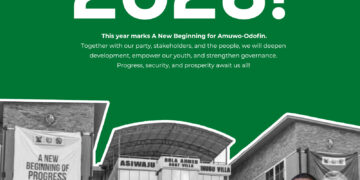By timeswatch
The insurgency in Nigeria has been a longstanding and complex issue, with various stakeholders contributing to its perpetuation. While the Nigerian government has made efforts to combat the insurgency, the conflict remains, with devastating consequences for civilians and the country as a whole.

One of the primary reasons for the persistence of the insurgency is the existence of an insidious cycle of interests, where various stakeholders benefit from the conflict. This cycle is fueled by corruption, greed, wickedness and a lack of accountability, which has become a norm in the Nigerian system.

At the heart of this cycle are politicians and government officials, who have vested interests in the continuation of the conflict. These individuals often use the conflict as a pretext to embezzle funds meant for counter-insurgency operations or to accumulate wealth and power through corrupt means. The military and many other security agencies are also complicit in this cycle. This has not only undermined the government’s efforts to combat the insurgency but has also contributed to the proliferation of small arms and light weapons in Nigeria.
Furthermore, some businessmen and contractors are also benefiting from the insurgency. They provide services and supplies to the military and other organizations involved in counter-insurgency operations, often at inflated prices. This has created a perverse incentive structure, where some individuals and companies have vested interests in the continuation of the insurgency.

To break these cycle of interests, the Nigerian government must take a decisive draconian action to address the root causes, unmask and bring to book the human elements behind the sustainability of the insurgency. This includes increasing transparency and accountability in the management of counter-insurgency funds, cracking down on corruption and criminality, and promoting responsible journalism, for misinformation is the Broadway to deformation.
The government must also engage in dialogue with local communities and stakeholders to address the underlying grievances that have contributed to the insurgency. This includes addressing issues such as poverty, inequality, and lack of access to education and healthcare.

No two ways about it! As long as stakeholders continue to benefit from the insurgency, it will remain a potent force.
– Ambassador Ezewele Cyril Abionanojie is the author of the book ‘The Enemy Called Corruption’. He is an award winner as Best Columnist of the year 2020, Giant in Security Support, Statesmanship Integrity & Productivity Award among others. He is the President of Peace Ambassador Global.






















Viele Spieler bevorzugen in diesem Zusammenhang die Freispiele als Angebot ohne Einzahlung.
Neue Online Casinos bieten verschiedene Arten von Boni an, die Du ohne Einzahlung
erhalten kannst. Dies funktioniert so, dass die Online Casinos Dich dazu auffordern, einen bestimmten Wert des Bonus ohne Einzahlung zu setzen, um ihn zu erhalten. Wie
bereits erwähnt, zahlst Du im Voraus kein eigenes Geld ein,
um Zugang zu einem Bonus im Online Casino zu erhalten. Um das kostenlose Geld zu erhalten, musst Du nach Deiner Anmeldung häufig
noch einen Teil Deines eigenen Geldes ausgeben.
Ein Echtgeld Bonus ist oft flexibler und für mehr Spiele einsetzbar,
deshalb sind Echtgeld Boni meist wertvoller für langfristiges Spielvergnügen und höhere Gewinnchancen. Freispiele ohne Einzahlung
bieten eine gute Gelegenheit, Online Slots kostenlos zu testen und kleine Gewinne zu erzielen. So können Sie neue Casino Angebote in aller Ruhe testen, bevor Sie
sich entscheiden und Echtgeld einzahlen. Prüfen Sie vorher,
wie viel Sie maximal mit dem Bonus gewinnen dürfen. Zum Beispiel,
ab 20 € Gewinn mit dem Spielen aufzuhören oder zu Echtgeld zu wechseln, wenn der Bonus ausgeschöpft ist.
Meistens erhältst du den Willkommensbonus auch erst, wenn du
eine erste Einzahlung getätigt hast. Genau diese
Bonusangebote möchten wir nun genauer unter die Lupe nehmen, damit du über alle verfügbaren Angebote bestens informiert bist.
In Online Casinos ohne Einzahlung erwarten dich in der Regel
zahlreiche Bonusangebote, die das Spielerlebnis noch spannender machen werden. Im folgenden Abschnitt wollen wir näher darauf eingehen, welche Bonusangebote in den Online Casinos Deutschlands auf dich warten. Bei
einem normalen Casino Bonus ist es in der Regel so, dass man eine Echtgeldeinzahlung tätigen muss, bei
der man dann einen entsprechenden Code angibt, um überhaupt für
den Bonus zugelassen zu werden. Daher nutzen sie Bonusangebote, um Spieler an ihre
Slots zu locken.
References:
https://online-spielhallen.de/stakes-casino-promo-code-ihr-guide-zu-boni-und-vorteilen/
Access a wide variety of slots and live dealer games. Download our app
today for exclusive bonuses and access to hundreds
of games on the go. New players at RocketPlay Casino receive a generous welcome package including a match bonus of up to $1,000 and
100 free spins on selected slots. IPhone and iPad owners
can easily place bets on their favorite sports, make deposits through various methods, and entertain themselves with a wide range of casino games at any time.
RocketPlay App Casino offers a seamless gaming experience on Android and iOS, with
free downloads and easy installation for users on both platforms.
Live dealer games, however, require real bets since they involve actual dealers.
Demos let you learn the game mechanics and features before playing with real money.
New players can claim up to $2,000 plus 100 free spins across
the first two deposits. It features a 10-tier system where every real-money wager
earns points, helping players progress through levels and unlock bigger rewards.
Overall, Rocketplay excels by combining security,
fairness, variety, and strong customer support into one platform.
The mobile platform works seamlessly across devices, and 24/7 customer support ensures help is
always available.
The pokies section features classic slots, video slots, and
progressive jackpots, ensuring a variety of themes and gameplay mechanics for every player.
The platform’s responsive design ensures a smooth login experience on both desktop and mobile devices.
RocketPlay Casino also features a mobile-friendly interface, allowing seamless access to games from both desktop and mobile devices.
References:
https://blackcoin.co/play-your-way-only-at-ac8-casino/
The Star Casino, part of The Star Entertainment Group, is a prime destination for those seeking entertainment and gaming in Australia.
This facilitates easier transactions for international patrons, enhancing their overall experience.
Beyond its gaming facilities, The Star Sydney is celebrated for
its luxury accommodations, comprising several hotels
and serviced apartments that cater to diverse guest preferences.
Yes, you can enhance your Marketplace listing to attract a larger
audience of potential buyers. An item may be disapproved on Facebook Marketplace if it fails to comply with the company’s established guidelines.
If you’re not upfront about any damage or wear and tear, the buyer could be
disappointed when they receive the item. Lastly, make sure to mark the item as "shipped" on the Marketplace.
Once you’ve shipped the item, be sure to provide the tracking information to the buyer.
This will vary depending on if you’re using your own shipping method or prepaid shipping labels.
While most shipments arrive on time, delays can sometimes happen. The responsibility for a secure transaction and timely delivery ultimately lies with the buyer and seller.
While it facilitates communication and provides tools for shipping, it doesn’t directly manage
payments or the shipping itself. It’s essential to understand that
Facebook Marketplace serves as a platform to connect buyers and sellers.
This enables buyers to conveniently track their package’s journey through the platform.
For even greater convenience, Facebook Marketplace allows you to
create a QR code for your shipping label.
References:
https://blackcoin.co/best-australian-online-casinos-aussie-gambling-sites-in-2025/
online slots uk paypal
References:
http://ptshop.co.kr/bbs/board.php?bo_table=free&wr_id=1327
australian online casinos that accept paypal
References:
https://jobsspecialists.com/companies/2025s-best-paypal-casinos-expert-verified-sites/
online pokies australia paypal
References:
https://gigmambo.co.ke/profile/juliannen9950